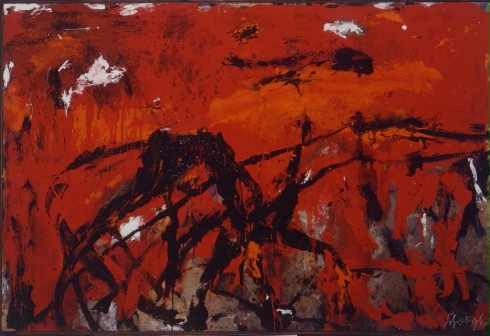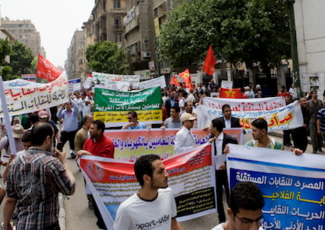
Καθώς το κράτος βρίσκεται στο επίκεντρο της κρίσης είτε ως κρίσης δημόσιου χρέους είτε ως κρίσης πολιτικής αναπαραγωγής του (είτε και ως συνάντηση αυτών των δύο), τα “δημοκρατικά” κινήματα της εποχής μας βρίσκονται παγιδευμένα στα γρανάζια του, στον κύκλο της αναπαραγωγής του, έναν κύκλο από τον οποίο δεν πρόκειται να διαφύγουν χωρίς να έρθουν σε ρήξη με τον εαυτό τους, και να αμφισβητήσουν το κράτος ως κράτος γενικά, και όχι ως “νεοφιλελεύθερο” κράτος, “αυταρχικό” κράτος κτλ. Κανένα νέο κράτος, καμία μεταρρύθμιση του κράτους, καμία αναδιάρθρωση του, καμία κατάληψη του, δε θα δώσει τη λύση στα προβλήματα των επαναστατών, κανένα κράτος δεν μπορεί να είναι αποτέλεσμα μιας νικηφόρας επανάστασης, γιατί ποτέ δε θα πάψει να είναι κράτος, δηλαδή η μηχανή που “μεταφράζει” την ταξική σύγκρουση σε ένα ολόκληρο νομικό-πολιτικό θεσμικό οικοδόμημα, το οποίο στηρίζει την αναπαραγωγή των καπιταλιστικών κοινωνικών σχέσεων. Αυτά, τα εντελώς θεμελιώδη, υπενθυμίζει ο “ύστερος” Αλτουσέρ σ’αυτό το μικρό δωρικού ρυθμού κείμενο (από το βιβλίο “Philosophy of the encounter”, που αναπαράγουμε εδώ (οι εμφάσεις με italics είναι του συγγραφέα, οι εμφάσεις με bold είναι δικές μας):
But if we take the concept of reproduction seriously; if we take seriously the requirement which ‘even a child would understand’ (Marx) – namely that, in order to exist, every ‘society’ has to reproduce the conditions of its own production, and that every class society has to perpetuate the relation of exploitation and of production that sustains it; if we conclude from this that the state plays, in this reproduction, a ‘special’ role, on condition that it is ‘separated’ from the class struggle in order to be able to intervene dependably in the service of the dominant class (a dependable servant has to be cast in a special metal and mentality); if, finally, the state can play a role only as a machine, then we are still not at the end of our labours.
For the attentive reader will certainly have noticed a curious sort of ‘play’ in our explanations.
Even if we admit the principle of the transformation of energy ensured by the state-machine, which – reproducing the result of class struggle – transforms the excess of Force of the dominant class into legal power tout court (the classes having been conjured away during this transmutation), the fact remains that we confront a situation which confront a situation which is hard to think.
If the state-machine serves to transform class Force or Violence into Power, and to transform this Power into right, laws and norms, it would seem that there is a before and an after, in the following order: before, there was the Force that is an excess of the Force of a dominant class over the dominated classes; this Force enters into the state-machine or the power-machine not as an excess of force, but as Force tout court, afterwards, at the other end of the machine, this Force emerges in the form of Power and its juridical, legal and normative forms (the way the pig comes out the other end of the meat-mincer as pate and sausages). Yet this is not quite how things happen, unless we are to trace the state back to its origin (which it is difficult to pinpoint), as Engels tried to do in his famous book (but without examining this Machine in detail). As for us, we are not only not in a position to reason about the origin; the origin, even if it could be pinned down, would be if absolutely no use to us. For what functions in the state today has nothing to do with the origin; it has to do with the forms if reproduction of both class society and the state-machine itself.
To put it another way: the Force that enters the mechanisms of the state-machine in order to emerge from them as Power (right, political laws, ideological norms) does not enter as pure Force, for the very good reason that the world from which it issues is itself already subject to the power of the state, hence to the power of right, laws and norms. This is as might be expected, since, in attempting to understand the class domination which requires a state for its defence and perpetuation, we invoked ‘the ensemble of the forms of class domination, in production, politics and ideology’. But the existence of the ensemble of these forms presupposes the existence of the state, right, political and other laws, and ideological norms. Thus there is no breaking out of the circle of the state, which has nothing of a vicious circle about it, because it simply reflects the fact that the reproduction of the material and social conditions encompasses, and implies the reproduction of, the state and its forms as well, while the state and its forms contribute, but in a ‘special’ way, to ensuring the reproduction of existing class society. The ‘special function’ of the reproduction of the state is the reproduction of the ‘special’ forms (those of the state) required to control the class conflicts that are, at the limit, capable of undoing the existing regime of exploitation. Gramsci mocked the Mancunian formula that made the state a ‘night watchman’, and he was right: for even when Mancunian capitalism was at its peak, it was absurd to conceive of the state as guarding society only at night, when everyone is asleep. The state is indeed a watchman, but it is a permanent watchman, on duty night and day, and it sees to it that, in Engels’s euphemism, ‘society’ is not ‘destroyed’ as a result of the struggle of its antagonistic classes. I would say, rather, that it sees to it that class struggle – that is, exploitation – is not abolished, but, rather, preserved, maintained, and reinforced, for the benefit, naturally, of the dominant class; hence that it sees to it that the conditions of this exploitation are conserved and reinforced. To that end, it also ‘keeps an eye out for’ explosions, which are always possible, as in 1848 and 1871 – there the result was bloodbaths – or in May 1968, when it was tear gas and the violence of street confrontations.
Continue reading →



